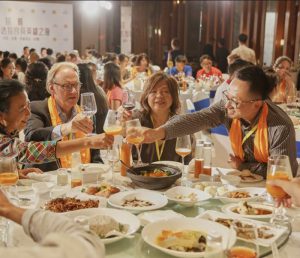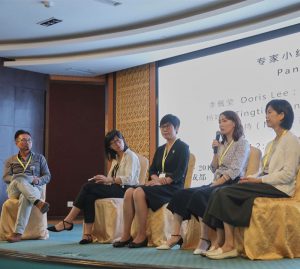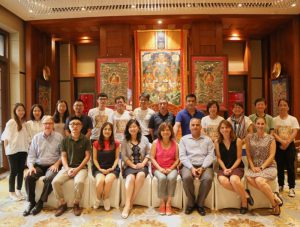
Good Food Hero Summit 2018
 Brighter Green co-hosted The Good Food Hero Summit in Chengdu, China, along with the Good Food Fund, part of the China Biodiversity Conservation and Green Development Foundation from August 5th—7th. Every summer, we invite change-makers from across China—the Good Food Heroes—to share their project ideas at the Summit and learn and receive mentorship from global leaders about how to practically promote research and action towards a sustainable food system in China and beyond. This is the second summit and information about the first summit, held in August 2017 in Yangzhou, China, can be found here.
Brighter Green co-hosted The Good Food Hero Summit in Chengdu, China, along with the Good Food Fund, part of the China Biodiversity Conservation and Green Development Foundation from August 5th—7th. Every summer, we invite change-makers from across China—the Good Food Heroes—to share their project ideas at the Summit and learn and receive mentorship from global leaders about how to practically promote research and action towards a sustainable food system in China and beyond. This is the second summit and information about the first summit, held in August 2017 in Yangzhou, China, can be found here.
 The theme of the Good Food Hero Summit 2018 was “Menus for the Future”—how public institutions can establish and implement a mindful food policy to lead the food system towards a healthy and sustainable future. The Good Food Fund, including its director, Jian Yi, and Brighter Green worked to bring together the best resources from different continents to illuminate sustainable food concepts as well as the establishment and implementation of effective food policies, together with visionary university and school managers, students, and other change-makers in public food services.
The theme of the Good Food Hero Summit 2018 was “Menus for the Future”—how public institutions can establish and implement a mindful food policy to lead the food system towards a healthy and sustainable future. The Good Food Fund, including its director, Jian Yi, and Brighter Green worked to bring together the best resources from different continents to illuminate sustainable food concepts as well as the establishment and implementation of effective food policies, together with visionary university and school managers, students, and other change-makers in public food services.

From left to right: Kristie Middleton, Becky Ramsing, and Rafi Taherian
Speakers came from world-level academic and professional backgrounds. Speakers from the U.S. included Rafi Taherian (Yale University), Kristie Middleton (the Humane Society of the U.S.), Becky Ramsing (John Hopkins University’s Center for a Livable Future), Greg Drescher (Culinary Institute of America), Erwin Li (Yale Sustainable Food Program), and Wanqing Zhou (Good Food Fund).
 Most of the speakers came from outside the U.S. and included Doris Lee (ProVeg International), Hyunjoo Lee (Meat Free Monday Korea), Jane Tsao (Biofarm), Zhu Yi (Health Culture Revival), He Congzhi (China Agricultural University), Mai Pham (Lemon Grass Restaurant), Michael Rosenblum (FMC Consulting Limited), Yang Tingting (Happy Meal Time), Cindy Wu (Food Talk), Chang Tianle (Beijing Organic Farmers’ Market), Zhang Min (Jiangsu No. 1 Farm Technology Co.), Zhang Shuilong (Eco-cat Xiamen Ecological Civilization Development Center), and Duan Baokun (Himalaya Happy Mandala Group). Photos and bios of the speakers can be found here. In addition to making presentations, these experts led workshops with Summit delegates to discuss and develop their project ideas; “mini-forums” provided another place for delegates and speakers to share their ideas and expertise. The food for the summit was plant-based and Justine Rist and Nikki Halsall were the two chefs there to test recipes and talk about cooking plant-based recipes.
Most of the speakers came from outside the U.S. and included Doris Lee (ProVeg International), Hyunjoo Lee (Meat Free Monday Korea), Jane Tsao (Biofarm), Zhu Yi (Health Culture Revival), He Congzhi (China Agricultural University), Mai Pham (Lemon Grass Restaurant), Michael Rosenblum (FMC Consulting Limited), Yang Tingting (Happy Meal Time), Cindy Wu (Food Talk), Chang Tianle (Beijing Organic Farmers’ Market), Zhang Min (Jiangsu No. 1 Farm Technology Co.), Zhang Shuilong (Eco-cat Xiamen Ecological Civilization Development Center), and Duan Baokun (Himalaya Happy Mandala Group). Photos and bios of the speakers can be found here. In addition to making presentations, these experts led workshops with Summit delegates to discuss and develop their project ideas; “mini-forums” provided another place for delegates and speakers to share their ideas and expertise. The food for the summit was plant-based and Justine Rist and Nikki Halsall were the two chefs there to test recipes and talk about cooking plant-based recipes.
 To start, some of the speakers and delegates of the Summit participated in a round-table with hospitality/food-service managers and head chefs in an effort to learn how public institutions can establish and implement a mindful food policy to lead the food system towards a healthy and sustainable future. Participants then gathered for a reception dinner to kickoff the summit. People met and came together over excellent food and were able to join together in song and dance. You can learn more and see additional photos here.
To start, some of the speakers and delegates of the Summit participated in a round-table with hospitality/food-service managers and head chefs in an effort to learn how public institutions can establish and implement a mindful food policy to lead the food system towards a healthy and sustainable future. Participants then gathered for a reception dinner to kickoff the summit. People met and came together over excellent food and were able to join together in song and dance. You can learn more and see additional photos here.
The theme of the first day of the Summit was “Building a Knowledge System.” The theme of the second day of the Summit was “Sharing Best Practices.” Click the links to learn more and see more photos.
More about our partners:
Approved by the State Council, registered in the Ministry of Civil Affairs, and supervised by the China Association for Science and Technology, the China Biodiversity Conservation and Green Development Foundation (CBCGDF, or GDF) is a nationwide non-profit public foundation and social legal entity dedicated to biodiversity conservation and green development.
GDF’s mission is to raise awareness and facilitate action at all levels of the society to support biodiversity conservation and green development, preserve resources of national strategic value, provide guidance to sustainable socio-economic development, promote the implementation of the concept of ecological civilization.
The Good Food Fund under the GDF focuses on research, communications, policy advocacy, events, public education, and incubating entrepreneurship related to the food system. It aims to facilitate shifts in food production, distribution, and consumption patterns towards a healthier, more environmentally friendly, and more sustainable food system.
 Brighter Green
Brighter Green



